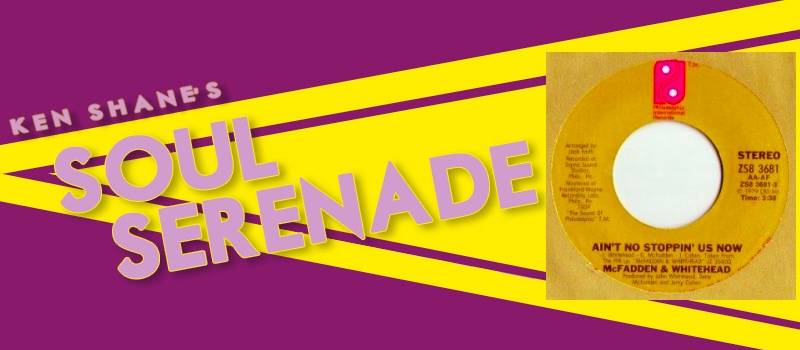 I try to keep my personal politics out of this column, but after a somewhat … unusual … convention in Cleveland, the circus has moved on to Philadelphia this week. It’s one of my favorite cities, and I don’t need any inspiration to write about Philadelphia music. But since the eyes of the world are focused on Philly this week I thought I’d add my gaze as well.
I try to keep my personal politics out of this column, but after a somewhat … unusual … convention in Cleveland, the circus has moved on to Philadelphia this week. It’s one of my favorite cities, and I don’t need any inspiration to write about Philadelphia music. But since the eyes of the world are focused on Philly this week I thought I’d add my gaze as well.
I’m in the middle of reading a fine book called A House on Fire: The Rise and Fall of Philadelphia Soul by John A. Jackson. According to Mr. Jackson, disco was invented in the City of Brotherly Love, specifically when session drummer Earl Young combined a thumping, four-on-the-floor bass drum rhythm with stick work on an open high-hat cymbal. When called upon by producers Kenny Gamble and Leon Huff in 1973 to play on the Harold Melvin & the Blue Notes session for “The Love I Lost” (a song that was originally intended to be a ballad), Young invented the disco beat right there on the spot. The resulting single featured Teddy Pendergrass singing lead, and it was Pendergrass who called the record “perhaps the first disco hit.”
Not long after the session for “The Love I Lost,” Young played on the O’Jays classic “Mighty Love,” which was produced by Thom Bell. “You hear that thing Earl did on the sock cymbal and that basically is what started the whole disco thing, right there,” Bell told Jackson.
And that, in a roundabout way, brings us to McFadden & Whitehead. Gene McFadden and John Whitehead began their careers as teenagers in a band called the Epsilons. Another member of that group was Lloyd Parks who would one day become one or Harold Melvin’s Blue Notes. No less than Otis Redding heard the band, and liked them enough to take them on tour with him. That of course ended when Redding died in a plane crash in 1967.
The duo recorded for Stax Records for awhile, and had a little bit of success with a 1970 single called “The Echo.” Eventually they landed at Philadelphia International Records where they achieved fame as songwriters and producers. Among the hits they penned were “Backstabbers” by the O’Jays, “Bad Luck” and “Wake Up Everybody” by Harold Melvin & the Blue Notes, and “I’ll Always Love My Mama” by the Intruders. In addition to those artists, McFadden and Whitehead worked as producers with the Jacksons, Lou Rawls, Gladys Knight, Stevie Wonder, James Brown, and Archie Bell & the Drells, among others.
In 1977, McFadden and Whitehead decided to again try to make a name for themselves as performers. Two years later they had a smash hit with “Ain’t No Stoppin’ Us Now.” The duo wrote the song with Jerry Cohen, and it was the first single from their self-titled debut album. The record scored across the board, topping the R&B chart, crossing over to #13 on the Billboard Hot 100, and reaching #10 on the disco charts. The two-million seller earned the duo a platinum record.
It is widely thought that the anthemic hit was an attempt at social commentary, but the fact is that McFadden and Whitehead had grown frustrated with Gamble and Huff’s refusal to see them as anything but songwriters and producers. The PIR owners even tried to convince the duo to give “Ain’t No Stoppin’ Us Now” to the O’Jays. McFadden & Whitehead weren’t having it though, and turned their song into the massive hit it became. So the lyrics were making a comment alright, and that comment was aimed directly at Gamble and Huff.
Subsequent McFadden & White singles like “I’ve Been Pushed Aside,” “I Heard it in a Love Song,” and “One More Time” appeared on the R&B chart but failed to find crossover success.
The way Casey Kasem told it, McFadden & Whitehead were the beneficiaries of a strange twist of fate. They were in Chicago promoting their music on May 25, 1979. They decided to do one more interview and re-scheduled their flight to L.A. for the next day. The flight they were originally supposed to be on, American Airlines flight 191, crashed just after take-off, killing all 258 passengers and crew.
Fate was not so kind to John Whitehead in 2004. He was standing on a street outside his home in Philadelphia when he was gunned down by a person or persons still unknown. No motive has ever been given, and there has been some speculation that the shooting was a case of mistaken identity. Whitehead was 55 years-old when he died. His partner, Gene McFadden, died of cancer three years later at the age of 57.
https://www.youtube.com/watch?v=CJTxnxXUMA0





Comments